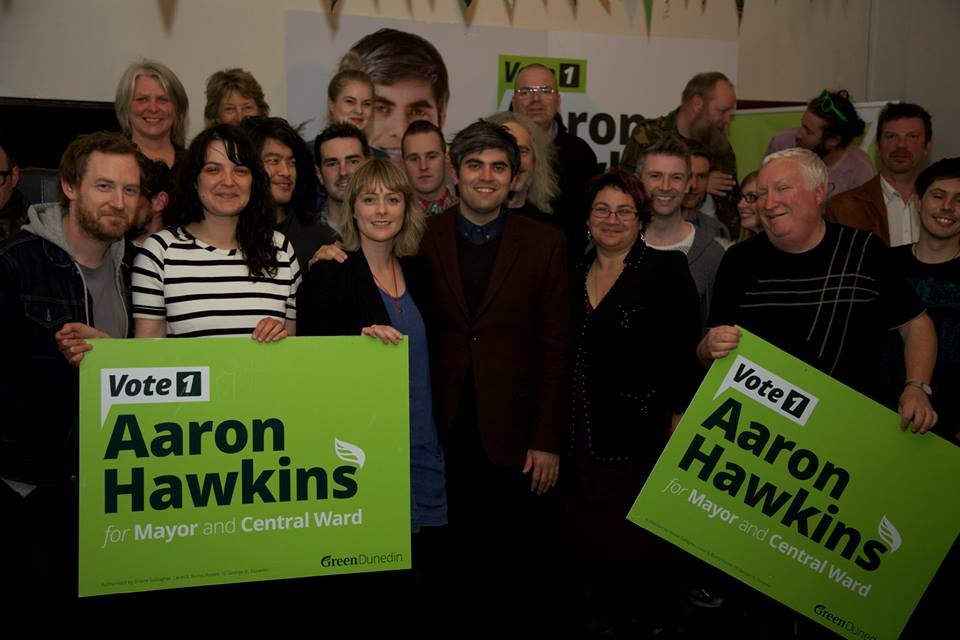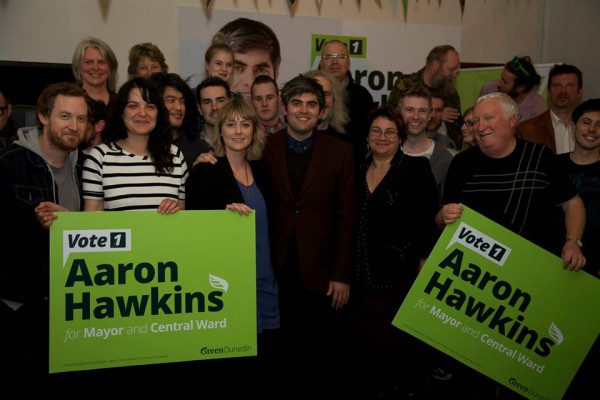Mayor Dave Cull has suggested we might move to a single city ward as a result of Andrew Noone’s default victory in Waikouaiti-Port Chalmers, leaving nearly 7,000 registered voters without a say at all on the make-up of the Council that governs them. Some planning functions, roading for example, would be decentralised to the community boards. I am certainly in favour of reviewing our ward boundaries ahead of the next election, but I can’t see this as the solution. It may increase the choice of candidates for residents (Port Chalmers farmers could vote for Mike Lord if they wanted him to represent their interests), but it in turn makes it harder for residents of those areas to be elected to Council in the future (given the lower voter base of their community relative to their urban/suburban counterparts). For this to be fair, the decentralisation would need to be so extensive as to give those living further out a form of Home Rule over their affairs. As Stu Fleming put it, “Dunedin has to figure out if it wants the large city boundary, or if it is really a central urban area with diverse communities attached. I think it is the latter. Council tends to tie itself in knots trying to reconcile the completely different needs.”
The bigger a ward becomes, the more difficult it is for candidates to connect with the voters whose support they need to make it to the Council table. There are two ways of doing this: having the free time and physical capacity to individually visit every household in the city (impossible if you have mobility issues, say, or a 9-5 job), or invest enough in advertising to get your message out that way. I already think charging people $200 to exercise their democratic right to stand is excessive. Setting the bar so high for a reaching the entire electorate only compounds this. Stacking the odds in favour of the independently wealthy or self-employed is bad for our democracy. We need to broaden demographic representation on Council, not narrow it.
There have been suggestions that the high number of candidates in one Central Ward may have something to do with the poor voter turnout. Did the sheer volume of candidates overwhelm potential voters, who gave up and didn’t bother? I’m not saying this is or isn’t valid, but we do need to talk to people who felt this way to try and get the best understanding we can of why participation in local democracy is plummeting. This is something that local authorities and iwi, central government, the Electoral Commission, our secondary/tertiary education system, community groups, and media outlets need to be working together on very seriously. Bryce Edwards has suggested an inquiry, but this can’t be a top down checklist of suggestions to be ignored by those with the power to enact them. It also can’t be One Size Fits All. It needs to driven at the community level, because it is the only way we will find local solutions to local problems.
Shifting the trend won’t be easy, and it may not happen quickly, but it is urgent that we begin to address it through as many avenues as possible. This is why I support the introduction of online voting – not because I think it will be the participatory lightning rod some seem to think, but because we can’t afford to sideline any tools that we may have at our disposal. The same goes for putting polling booths on University campuses. We know that the student demographic have very low participation rates, a polling booth (even short term) is a move that we know would increase that with a captive audience of thousands of them on any given day. Big problem areas with simple solutions are the simplest place to start.
How we run our elections, and how we can increase the level of participation in them, are big questions that require strong public input to be meaningfully answered. The incoming council has plenty of other pressing concerns (finishing and implementing our Energy Plan and Transport Strategies among them), but it is worth kicking these big ideas around now while the most recent local election is still fresh in our minds.
Finally, might I just say that it is an honour to have been asked by the people of Dunedin to represent them on the Dunedin City Council. Thank you to everyone who offered their support and encouragement over the past year, allowing me to end up where I have. To be honest, it hasn’t really sunk in yet, and it has been an emotional few days, but I look forward to fighting for our future as a smart, green city for many generations to come.







Congrats from Wellington Greens, Aaron!
yes, congratulations Aaron, and all the best.
The photo gives a clue to some of the solutions to the problems of interest in local government – you are a Green Party candidate/councillor, selected, I assume, by the collective wisdom of your local colleagues instead of the misguided self-selection of so many. So you are probably more competent.
As a party candidate you will have had help from many more than the ones in the photo in making the necessary relationship with the voters, not to mention logistical and financial help.
More important, as a party candidate your electors have some idea of the beliefs that will underpin your work – at the very least they have not been put off by those beliefs, quite possibly it has helped. We need more politically identifiable people in local government. I am very sad that so many stop claiming those beliefs, as formerly-Labour Lianne Dalziel and formerly-Green Celia Wade-Brown, and so many others have done. I hope there will be some attempt to see whether your success has been repeatable elsewhere, if so times may be a-changing.
But please, don’t go with the one-ward situation – unless you have a fair voting system you get one-party government. I lived twenty years in Auckland, where for decades National, aka Citizens & Ratepayers, would win all but one or two seats on council.
+1 (sorry, for some reason the rating system isn’t working for me)
Agreed on the one-ward system too. I live in a place where wards were abolished, and trying to sort through and rank (we have STV) over 30 candidates is a real mission. While I personally made the effort (with the help of a few others) to try to identify the candidates and where they stand, I’m willing to bet that the majority of electors haven’t done so. Hence, most councillors were elected purely based on name recognition and who sent out the most leaflets. Not the kind of democracy we want…
Congratulations, Aaron. It’s been great to see many of the Green (and Labour, and Mana) candidates get onto local boards and councils this election!
What’s not so great is the very low turnout to these elections, I agree. I remain opposed to computerised voting (particularly online), because I’m yet to be convinced that mass-scale manipulation will not be able to occur. While I do work with computers, I know how stupid they are, hence how easy they are to manipulate for those with malicious intentions. Especially considering this government’s record with computer systems (and corruption), I really wouldn’t trust them around organising online elections. Even private institutions often have a vested interest in results, particularly those of the general elections (I seriously hope computers never get anywhere near those ones).
That’s just on the server end. We already know the GCSB/SIS are able to access the transmissions on the internet, and we know how trustworthy and transparent they are, so there’s a large risk there too. And on the client end, there are undoubtedly many computers which are infected with malware. All-in-all, the risks outweigh the benefits in my opinion. Though I seem to be becoming a dying minority.
Personally, I believe one of the better solutions would be to return to polling booths. However, they should be held on a weekday, and that day should be a public holiday. I doubt many people could use the excuse of “forgetting” when they have a day off work, and the holiday could also inspire those people to vote. This doesn’t fix the largest problem with local elections though, where voters often no little or nothing about the proposed candidates, which is primarily the fault of the media.
Larger wards have lower STV quotas, so in theory they should result in a more diverse range of councillors. If a candidate is unable to campaign city-wide, they could focus their campaign on one particular area. If one candidate does very well in West Harbour or South Dunedin, then it doesn’t matter if they don’t have as much recognition city wide, as that suburb/town has provided them with enough votes to reach the quota.
But I do agree that the large number of candidates resulting from large wards will put people off. It is challenging to rank 35 candidates, especially when some are not providing much information about themselves (I tend to treat those candidates with suspicion). I found the information supplied by Critic and Generation Zero very useful in helping me make my decision. Hopefully in future other organizations will follow suit and publish their own easy to follow rankings of candidates’ policies.
Comments are closed.